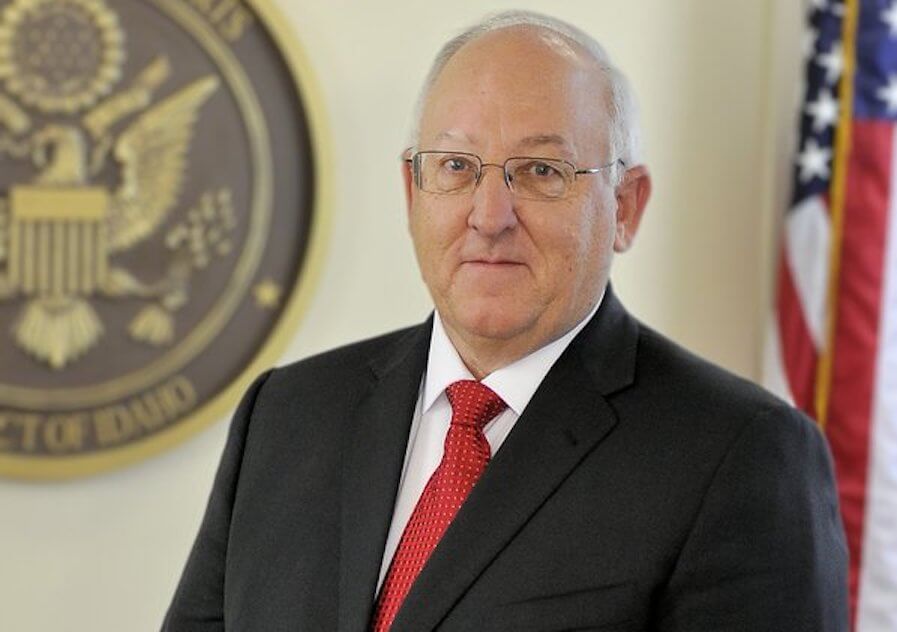An Idaho “bathroom law” that was enacted on March 22 and went into effect on July 1 requires public school students in the state to use restrooms or locker rooms consistent with the sex they were assigned at birth and applies a similar requirement for “overnight accommodations” on school travel. The law also requires the schools to accommodate students with a gender-neutral facility.
A student who confronts a person of the opposite “biological sex” — meaning sex assigned at birth — in a restroom or locker room where the school district has authorized such usage can sue the school district for damages for violation of their privacy for up to $5,000.
A transgender student, named Rebecca Roe for purposes of the legal challenge, filed a federal lawsuit challenging the law as a violation of the Equal Protection Clause of the 14th Amendment, of Title IX of the Education Amendments Act (which forbids sex discrimination in educational institutions), and of the 14th Amendment’s due process privacy rights of transgender students. She was joined by the Sexuality and Gender Alliance, represented by Lambda Legal and cooperating attorneys from several law firms.
The case was assigned to Chief US District Judge David C. Nye, of the US District Court in Idaho. Judge Nye served for several years as an Idaho state judge, having been appointed by Republican Governor Butch Otter. Judge Nye was first nominated to the federal district court by President Barack Obama, a Democrat, but at a time when the Senate Republican majority was blocking most of Obama’s judicial nominations, so Nye’s nomination did not then get a confirmation vote although it was approved by the Judiciary Committee. However, both of Idaho’s Republican Senators recommended Nye to the incoming Trump Administration, which renewed the nomination. Nye was then confirmed by a unanimous Senate vote. This is an unusual case of a Trump appointee who was also an Obama nominee and whose selection was truly bipartisan.
Judge Nye granted a temporary restraining order on August 10 to block the law from being enforced until the state had an opportunity to respond to the lawsuit, finding that the plaintiffs’ allegations supported preserving the “status quo” prior to enactment of the law. However, on October 12 he denied the plaintiffs’ motion for a preliminary injunction that would have continued to block enforcement while the parties litigated over a final decision on the merits of plaintiffs’ claims. At the same time, however, he denied a motion by the state to dismiss the lawsuit. His decision denying the preliminary injunction was appealed to the San Francisco-based Ninth Circuit Court of Appeals by the plaintiffs on October 16.
“This is a difficult case,” wrote Judge Nye, as he had in his earlier opinion granting the temporary restraining order. “Each of the parties before the court seeks to protect important individual rights. The critical question, however, is what happens when individuals’ rights converge and those rights struggle to co-exist?” He emphasized that no matter how he decided the plaintiffs’ motion, somebody’s rights could be adversely affected. He was referring to privacy rights, protection of which the state argued was the purpose of the law.
The judge noted that at the time the law was passed, 25% of Idaho school districts had adopted inclusive policies allowing transgender students to use restrooms consistent with their gender identity, while the remaining 75% had not adopted a formal policy. The 25% probably responded to Obama Administration guidance under Title IX, which was later rescinded by the Trump Administration.
The Idaho legislature declared that the law was intended to protect the privacy rights of all students by shielding them from exposing their bodies to students of the other biological sex, and the state denied that the bathroom bill discriminated based on gender identity or transgender status. The plaintiffs sharply argued to the contrary, pointing particularly to a prior Ninth Circuit ruling rejecting a lawsuit by parents who were challenging a school district’s policy of allowing transgender students to use restrooms consistent with their gender identity.
In a tightly reasoned decision that showed sensitivity to the arguments of both sides, Judge Nye explained that the key to getting a preliminary injunction is convincing the court that the plaintiffs are likely ultimately to prevail on the merits of their claims, while the key to defeating a motion by defendants to dismiss the case is to show that the plaintiffs have asserted plausible legal claims. He concluded that under the current state of the law neither the plaintiffs nor the state had met their burdens to persuade the court to grant their motions.
Federal courts are sharply divided on the issue of whether laws like Idaho’s violate the Constitution or Title IX. In the early stages of litigation over this issue, several district courts and two federal appeals courts — the Fourth and Seventh Circuits — sided with transgender students seeking to use restrooms consistent with their gender identity. However, more recently the 11th Circuit, in an en banc ruling from Florida, decided the issue the other way.
Distinguishing the Ninth Circuit’s prior ruling in the parental privacy lawsuit, Judge Nye asserted that the court in that case found that a gender-inclusive policy was not unconstitutional, but he insisted that this did not mean that a like Idaho’s — segregating people by the sex they were assigned at birth — was unconstitutional. In his view, the Ninth Circuit hasn’t decided this issue yet, and the other courts of appeals that have ruled are divided. In that situation, he concluded the ultimate decision could go either way, so plaintiffs had failed to show that they were “likely” to prevail.
The split of appellate authority makes it likely that the Supreme Court will grant review in one of these cases before too long, and this may even be the case in which that happens, as the plaintiffs quickly filed an appeal of Judge Nye’s denial of the preliminary injunction.
Along the way, Judge Nye asserted several conclusions that differ from the rulings in other federal circuits. Perhaps most controversially, he concluded that the Idaho law does not discriminate based on gender identity for constitutional equal protection purposes. The law makes no reference to gender identity or transgender status and, he observed, it distinguishes solely based on “biological sex,” which is a different thing from gender identity. As such, it was subjected to intermediate scrutiny, but he found that the plaintiffs had not shown that the state would most likely fail to sustain the law under that level of review, because he accepted at face value the state’s privacy protection argument as a legitimate important interest to justify the policy.
The plaintiffs relied on the Supreme Court’s Bostock decision, interpreting Title VII of the Civil Rights Act of 1964 to encompass discrimination based on transgender status as an aspect of discrimination because of sex, but Judge Nye saw distinctions between the Title VII analysis and a constitutional equal protection analysis, so he did not find Bostock binding on this issue. He noted that Judge Neil Gorsuch’s opinion in Bostock disclaimed any ruling about bathroom access, or about issues under any other federal law than Title VII.
As to Title IX, Judge Nye noted that federal courts are now divided about how the Bostock ruling may relate to Title IX, and that there is a Title IX regulation that appears on its face to allow exactly what Idaho has done in this case, to maintain separate restrooms and changing rooms for “biological” males and females. The court accepted the state’s argument that “sex” used in this context means biological sex, pointing out that in Bostock the Supreme Court treated the meaning of “sex” that way. This conclusion was rejected by the Fourth and Seventh Circuit courts.
As to the privacy issues, the plaintiffs argued that requiring transgender students to use restrooms consistent with “biological sex” or gender-neutral restrooms effectively “outs” them as transgender, thus disclosing intimate details. A transgender student who urgently needed to use a restroom without time to seek out what may be a remotely-located gender neutral one would be required by this rule to use the boys’ restroom, for example, making her transgender status obvious. On the other hand, the state argued that the privacy issue goes both ways, and allowing transgender students to access restrooms consistent with their gender identity would violate the privacy rights of cisgender students. Judge Nye was not convinced by the plaintiffs’ argument that transgender students would necessarily use individual stalls and not expose their bodies to other users of the restroom. As Judge Nye sees it, either way somebody’s privacy rights may be impaired, so at this stage of the case, he can’t conclude that plaintiffs are likely to prevail on the privacy issue.
The judge also found that the other factors considered on deciding motions for preliminary injunctions did not tip the balance in favor of plaintiffs.
However, noting the decisions from the 4th and 7th Circuits that supported transgender restroom access claims, he could not conclude that plaintiffs have not stated any plausible legal claims at this stage of the lawsuit, so it would be inappropriate to dismiss this case without giving the plaintiffs a chance to litigate, whether through a trial or a summary judgment proceeding, after full discovery by both sides.
Nye concluded that “this area of the law (and social policy) is evolving. The Court, however, must stay in its lane. It cannot provide guidance on how elected officials should navigate these difficult situations. It can only decide whether the action they have taken withstands constitutional scrutiny. As the Sixth Circuit aptly noted just a few weeks ago with respect to regulations about medical care for transgender minors: ‘Life-tenured judges construing a difficult-to-amend Constitution should be humble and careful about announcing new substantive due process or equal protection rights that limit accountable elected officials from sorting out these medical, social and policy challenges.’” He also noted that the law required schools to provide “a reasonable accommodation for any student who feels he or she cannot follow the law. That not all people agree with the law is the reality of living in a pluralistic society where everyone cannot have everything they want according to how they see the world.”
Predicting how Judge Nye’s ruling will fare in the 9th Circuit is not a simple matter. There was a time when the 9th Circuit was seen as the most progressive federal circuit, heavily dominated by judges appointed by Democratic presidents, but that time is now past. Of the twenty-eight active judges, fifteen are Democratic appointees and thirteen are Republican appointees. The three-judge panels that initially consider appeals are composed by a random process, and it is not unusual to find panels with two or three Republican appointees, including panels composed entirely of Trump appointees, as more than a third of the circuit judges were appointed by Trump. On the other hand, it is still possible for a randomly-composed panel to have a majority of Democratic appointees, so how this will turn out is anyone’s guess.

































